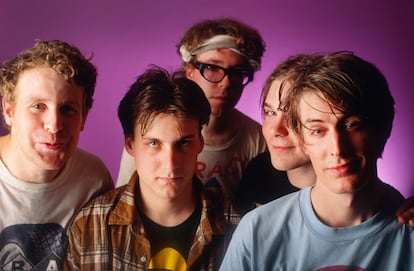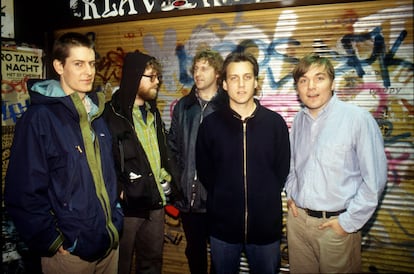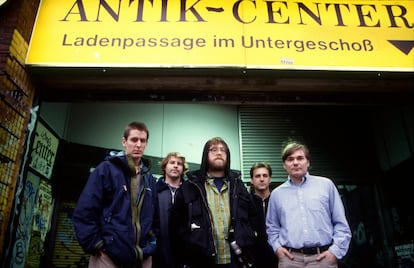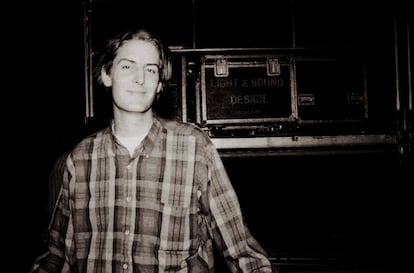How Pavement was reborn: The 1990s indie band with 200 million Spotify streams
‘Pavements,’ by Alex Ross Perry, has just premiered in the US and recounts, in a very peculiar way, the singular career of a band that has spent decades running from success — only to keep stumbling into it

Pavement’s story should have remained simple: while they never reached the mainstream heights of Nirvana or R.E.M., they were, for many, the definitive cult band of 1990s alternative rock. Between 1989 and 1999, they released five albums and 10 EPs before disbanding, the result of a unilateral decision by frontman Stephen Malkmus. Yet in their absence — and thanks in part to the rise of the internet — their cult following only grew, with new audiences and fellow musicians embracing them.
In 2010, they reunited, and their first move was a bold one: selling out five nights at New York’s Central Park, despite never having played beyond 3,000-seat venues during their initial run (festival appearances aside). A decade later, they announced another reunion tour, set to launch with a headlining slot at Primavera Sound. Around the same time, a forgotten B-side, Harness Your Hopes, inexplicably went viral and became the most-streamed song of their career, bringing in yet another generation of fans — and prompting the band to shoot a music video for it.
But perhaps the most unexpected twist in their story is Pavements, one of the strangest and most inventive music films ever made. The film premiered in U.S. theaters on May 2 after screening at several festivals, including its debut at Venice last year.

Directed by independent filmmaker Alex Ross Perry, Pavements is a bold rejection of the typical rockumentary — a film that subverts every convention of the genre. In truth, it’s four films in one, running concurrently.
The most straightforward of these strands follows the band during preparations for their final reunion tour in 2022, intercut with archival footage from their heyday. This is then intertwined with scenes from a fake Hollywood biopic, a glossy big-budget production titled Range Life: A Pavement Story, in which the band is mythologized as the greatest rock act of their generation. Joe Keery (of Stranger Things fame) plays Stephen Malkmus as a committed method actor, while Jason Schwartzman appears as the head of Matador Records.
Even more suprising is the footage of a theatrical musical called Slanted! Enchanted!, with performers singing Pavement songs and executing surreal, stylized choreography. The final narrative thread features the actual band wandering through Pavements 1933–2022, a retrospective exhibit staged at a New York gallery in their honor.
This multi-layered, metatextual interplay is driven by sardonic, deeply personal humor — it never clarifies what is real and what is invented. Some clues are offered: the exhibit includes spoof ads for Apple and Absolut, suggesting fabricated moments when the band supposedly “sold out.” There’s even a display of their Lollapalooza stage outfits, allegedly preserved in their original mud-streaked condition for three decades.
And yet, some elements are true. The exhibition really did happen, albeit as a pop-up show, and the tribute concert — featuring younger acts like Snail Mail and Soccer Mommy covering Pavement songs — was also real. As for the musical, it ran for three nights at an off-Broadway theater to glowing reviews. Rob Sheffield of Rolling Stone wrote that watching actors perform Wowee Zowee‘s most esoteric tracks with blank expressions amounted to “the ultimate absurdist theater experience.”
The biopic in Pavements, however, was never actually shot. Perry has described Pavements as “a semiotic experiment,” likening it to an imagined film about Bob Dylan that simultaneously blends the documentaries Don’t Look Back by D. A. Pennebaker and Martin Scorcese’s Rolling Thunder Revue with Todd Haynes’s I’m Not There and Dylan’s own Renaldo and Clara. But perhaps the most original aspect is Perry’s process: rather than writing a conventional script, he orchestrated pseudo-events — such as a fake Range Life premiere — with the intention of making them part of the film.
The (anti)heroes of slacker culture
Pavement was born in the late 1980s in Stockton, California, initially as a project of vocalists and guitarists Stephen Malkmus and Scott Kannberg. They were upper-middle-class suburban kids with no artistic background in their families (Malkmus’s father was an insurance agent).
It was in college that they became interested in the music of groups like The Velvet Underground, Can, and The Fall, and began playing and writing songs. Their debut EP, Slay Tracks: 1933–1969, was released in 1989 and recorded at the home studio of drummer Gary Young, a much older hippie with erratic behavior who once said “this Malkmus idiot is a complete songwriting genius.”
Young was soon recruited into the band, and with the additions of bassist Mark Ibold and second drummer Bob Nastanovich, Pavement recorded their first full-length album, Slanted and Enchanted (1992) — a release that instantly made them one of the most influential groups of their time.

Pavement was supposed to have arrived at the right place at the right time. Nevermind by Nirvana had just revolutionized the music industry, and major record labels were scrambling to sign alternative rock bands. Most of the leading acts of that movement — from R.E.M. to Sonic Youth, The Lemonheads, Dinosaur Jr., and Throwing Muses — had already been picked up by multinational labels and were enjoying regular airplay on mainstream platforms.
The band from Stockton, however, remained firmly rooted in the truly independent scene, becoming the emblem of what came to be known as slacker culture — the most authentic hallmark of Generation X. They didn’t seem to care about polished recordings or technical precision, singing and playing with a certain sense of apathy. They resisted the idea of “selling out” and infused their performances with irony and a kind of bored detachment, as a way of rejecting everything around them.
“We were definitely unafraid of playing wrong notes and singing wrong things. We could be fearlessly bad,” Malkmus said in an interview, without clarifying whether he was serious or joking. The fact is despite their sloppy and fragmented approach to composition and recording, underneath it all was a remarkable gift for crafting captivating melodies.

On their first European tour in 1992, chaos reigned — largely due to the eccentric and consistently unpredictable antics of their alcoholic drummer, Gary Young. Each night, he would take the stage to greet the audience with a bizarre talisman (ranging from bits of plastic and coins to matches, cabbage, or even mashed potatoes).
At times, he would dash wildly around the venue mid-performance, or more often, simply fall off the drum kit in a drunken stupor. The situation soon became untenable, and the band eventually fired him, replacing him with Steve West. After his departure, legend has it that the former drummer turned to building and selling dog kennels — though this may be an urban legend. What is known is that he recorded four solo albums and passed away in 2023 at the age of 70.
Dressed for success that never came
With the new, now definitive lineup, Pavement went on to record their most popular album, Crooked Rain, Crooked Rain (1994), which nearly propelled them into mainstream success — largely thanks to the music video for Cut Your Hair, which was often played on MTV.
However, when the animated duo Beavis and Butt-Head — alternative icons in their own right — commented on the video, they yelled at the screen: “I want you to try over and try harder!” In Here, one of the most memorable songs from their debut album, Malkmus sang, “I was dressed for success / But success it never comes,” though the line was delivered with irony.
The band had no interest in making compromises for a broader audience. “If we had been signed to Gold Mountain management [which managed Nirvana and Sonic Youth] or if we had signed with Geffen Records, maybe Crooked Rain sells 750,000 copies instead of 250,000. But it was really just the difference between being Pavement or being Weezer,” Malkmus told Chuck Klosterman in a 2010 GQ article titled The Greatest. Indie-est. Band. Ever. “I never had a great deal of confidence in my ability to write hits. There’s a formula to that, and I’m not a good chorus writer. I’m better at verses. Sometimes I don’t even get to the chorus,” he confessed.
The problem was that his sarcasm didn’t always land. One of the band’s most notorious controversies came from the lyrics of Range Life, in which Malkmus sang: “On tour with The Smashing Pumpkins/ Nature kids, I, they don’t have no function / I don’t understand what they mean/ and I couldn’t really give a fuck / The Stone Temple Pilots, they’re elegant bachelors/ They’re foxy to me, are they foxy to you?/ I will agree they deserve absolutely nothing.”
Apparently, Billy Corgan was so offended he demanded Pavement be removed from the Lollapalooza lineup, where they had been slated to appear alongside the Pumpkins.
Following their near-brush with mainstream success, Pavement self-sabotaged with their third album. Wowee Zowee was released in 1995 as a double LP with three sides (one of which was left blank) and a slew of experimental, chaotic tracks that were, by all accounts, influenced by heavy marijuana use. That same spirit carried over into their live shows, which became more improvisational and erratic. This time, they did play Lollapalooza, but during the Virginia stop of the festival, they were pelted with mud-covered rocks and walked off stage after one rock struck the singer. The drummer responded to the crowd by yelling “Fuck you!” and mooning them as a farewell.

Brighten the Corners (1997) once again surprised fans with a shift toward a more accessible sound, while Terror Twilight (1999), recorded with Radiohead producer Nigel Godrich, came together without much creative chemistry. By then, Malkmus had grown disillusioned with the band. At their final concert, at London’s Brixton Academy, he symbolically expressed his mood by placing handcuffs on the mic stand. That marked the end of Pavement — quietly, through the back door, with little fanfare — until 2010, when their reunion was met with huge enthusiasm.
Initially planned as a one-off benefit concert in Central Park, tickets sold out in two minutes. It eventually became a five-night run, followed by a world tour that included a headlining slot on the main stage at Primavera Sound in Spain. Ten years later, they announced two special shows to mark the band’s 30th anniversary, at the Barcelona and Porto editions of the same festival. Due to the pandemic, those shows were postponed until 2022 and expanded into a new tour — their most recent to date.
The strange case of the algorithm that made them viral
Despite two reunions, Pavement hasn’t released new music since 1999. Yet in May 2024, they earned their first gold record — thanks to Harness Your Hopes, a B-side from their penultimate single, Spit on a Stranger, which the band barely remembered existed. It’s a bizarre story: the song began going viral on Spotify around 2017 for reasons that remain unclear. Some attribute its sudden popularity to the platform’s autoplay function: when an album ends, Spotify’s algorithm queues a sonically similar track. Apparently, something in the system’s programming caused this obscure song to keep surfacing — an example of how “invisible hands” shape today’s music consumption in powerful ways.
Harness Your Hopes is now by far Pavement’s most-streamed song on Spotify, with over 200 million plays — four times as many as their runner-up, Cut Your Hair. The band has also seen other cultural nods in recent years: in Barbie, Greta Gerwig includes a scene where Ken mansplains Stephen Malkmus’s songwriting genius to Barbie, and singer Beabadoobee also gave him a shoutout in her track I Wish I Was Stephen Malkmus.
Despite this renewed attention, Pavement appears to be on hiatus for now. Last year, Malkmus launched a new band, The Hard Quartet, which is kicking off a European tour in June.
Sign up for our weekly newsletter to get more English-language news coverage from EL PAÍS USA Edition
Tu suscripción se está usando en otro dispositivo
¿Quieres añadir otro usuario a tu suscripción?
Si continúas leyendo en este dispositivo, no se podrá leer en el otro.
FlechaTu suscripción se está usando en otro dispositivo y solo puedes acceder a EL PAÍS desde un dispositivo a la vez.
Si quieres compartir tu cuenta, cambia tu suscripción a la modalidad Premium, así podrás añadir otro usuario. Cada uno accederá con su propia cuenta de email, lo que os permitirá personalizar vuestra experiencia en EL PAÍS.
¿Tienes una suscripción de empresa? Accede aquí para contratar más cuentas.
En el caso de no saber quién está usando tu cuenta, te recomendamos cambiar tu contraseña aquí.
Si decides continuar compartiendo tu cuenta, este mensaje se mostrará en tu dispositivo y en el de la otra persona que está usando tu cuenta de forma indefinida, afectando a tu experiencia de lectura. Puedes consultar aquí los términos y condiciones de la suscripción digital.








































